10th March 2025
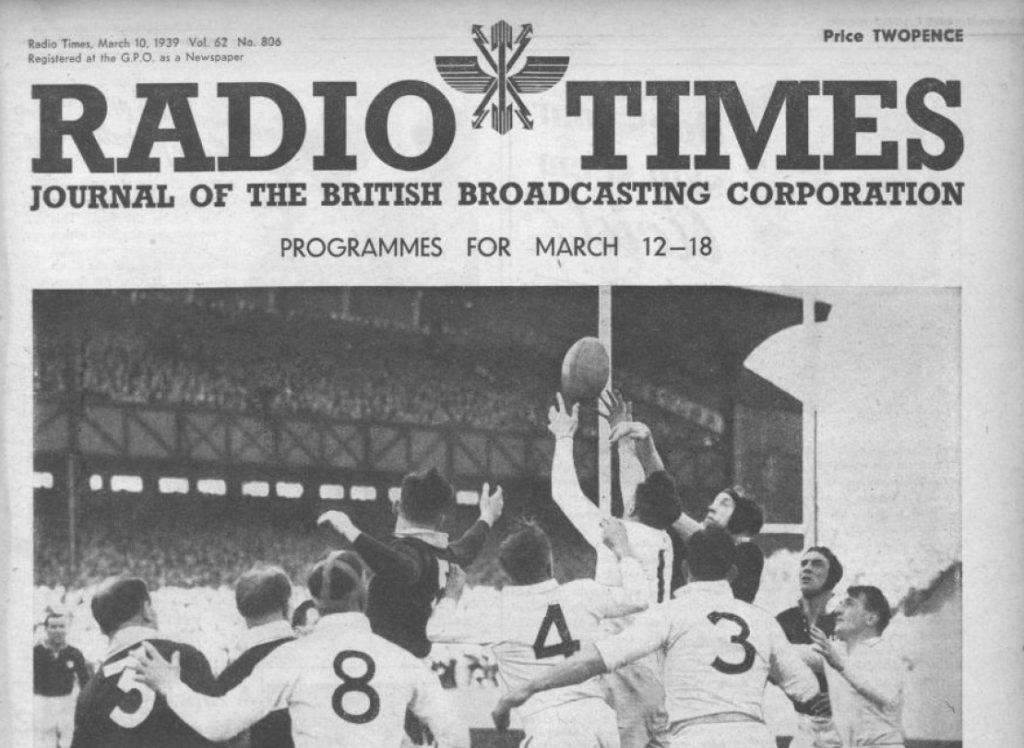
John Wyver writes: Friday 10 March 1939 saw the publication of Radio Times issue no 806. Around one-third of the copies distributed in the south of England carried television listings and the ‘diary column written by ‘The Scanner’.
These ‘television editions’ are a key element of the pre-war medium, not least because they would have been seen more regularly by far more people than would have had domestic receivers, of which there were perhaps just 18,000 in spring 1939. For many people, these magazines defined what television was.
read more »
9th March 2025
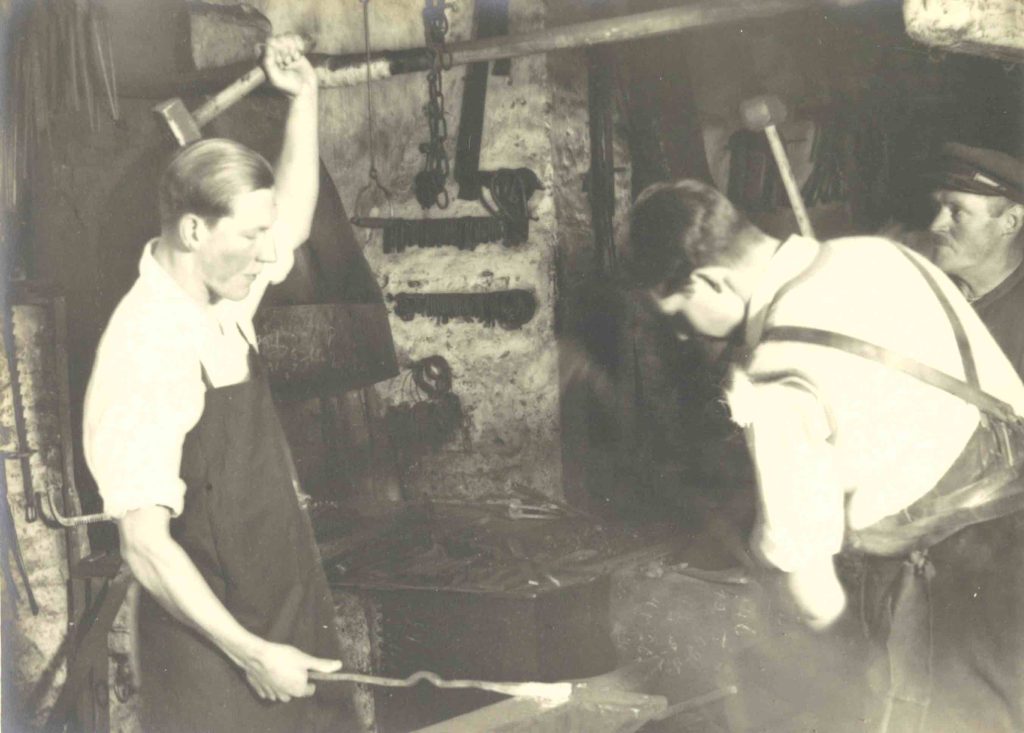
John Wyver writes: The Spring 1938 Craftsmen at Work series featured demonstrations in the AP studio of a potter at work at a wheel, of whisket-making (constructing baskets from strips of oak), withy-weiving (working with willow) and, on 9 March, a blacksmith. The series was one element of television starting to look beyond London and embrace rural England, also apparent in the monthly OB broadcasts On the Farm.
For the blacksmith, a furnace was installed in the lower scene dock, although it proved hard to get the camera sufficiently close to see details. As a critic recorded,
The swift balanced movements of the man, and his shadow against the wall were decorative and exciting to watch, but of the actual job in hand, we could see little or nothing.
read more »
8th March 2025
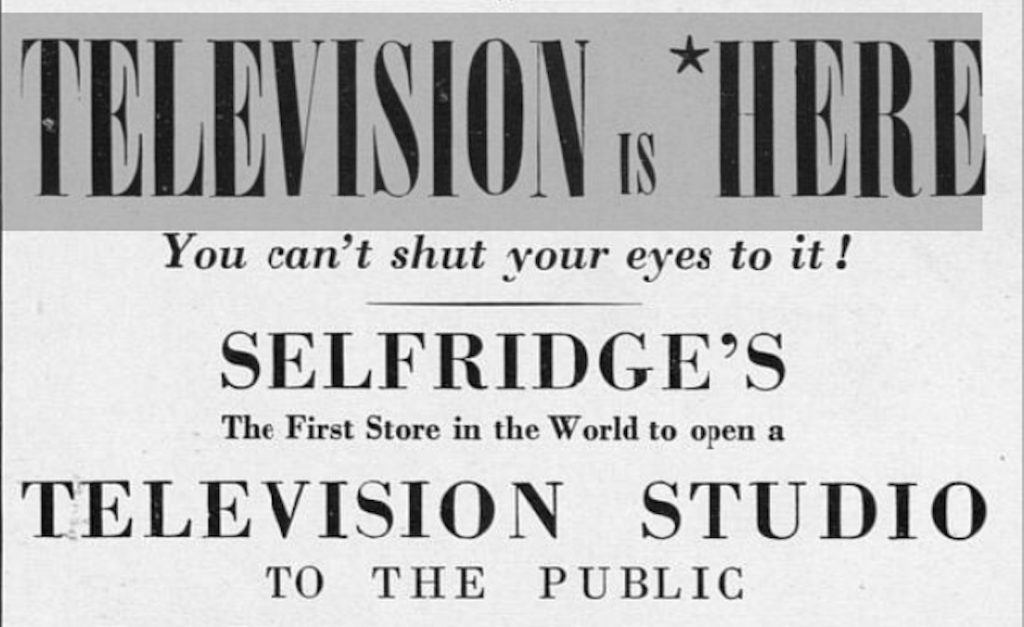
John Wyver writes: The 8 March 1939 edition of the popular magazine The Bystander carried a quarter-page ad for the recently-installed television studio at Selfridge’s in London’s Oxford Street. ‘TELEVISION IS *HERE’, it proclaimed. ‘You can’t shut your eyes to it!’
By *HERE the ad meant the department store that had been a site strongly associated with television ever since John Logie Baird’s first demonstrations of his 8-line system back in March 1925. Extending its celebration of all things modern, Selfridge’s had frequently hosted further demonstrations and was a key central London sales site for receivers.
read more »
7th March 2025
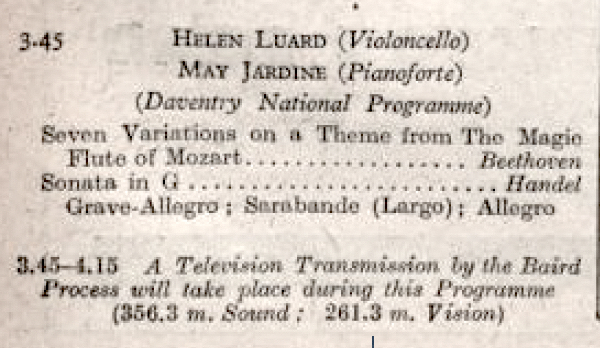
John Wyver writes: The National and Regional programmes on the afternoon of Monday 7 March 1932 carried a radio broadcast of a violin and piano recital given by Helen Luard and May Jardine. But their programme of Beethoven and Handel was also one of a series of simulcasts with the Baird 30-line television operation.
The Baird company, which in the spring of 1932 was still operating the 30-line service that would be taken over by the BBC later in the year, had introduced a portable scanner to the BBC studios at Savoy Hill in the summer of 1931. In mid-August this was first used to broadcast images of a late evening radio broadcast by Jack Payne and his dance band.
read more »
6th March 2025
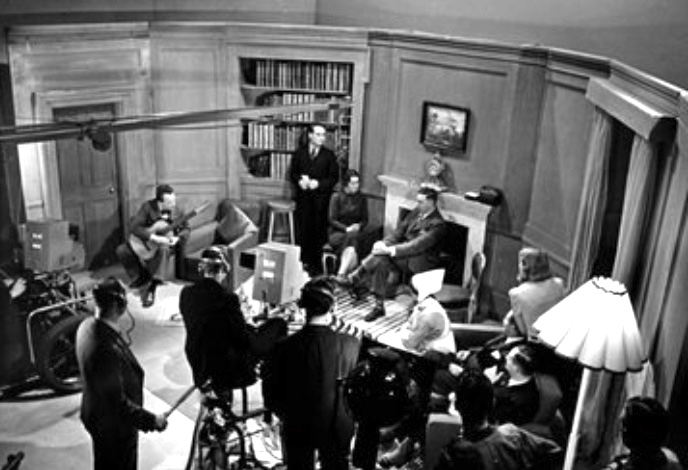
John Wyver writes: Late – well, 10.24pm, delayed because of a boxing bout – on the the evening of Monday 6 March 1939, the fifth edition of a series called Guest Night (above) gathered six guests and host A.G. Street to discuss ‘the refugee problem’. This was just 9 days before German troops marched into Czechoslovakia, prompting a significant increase in the number of people fleeing the Nazis.
Guest Night was a bit like Channel 4’s celebrated After Dark series, bringing together a disparate group of people to discuss a theme, albeit with a roughly 45-minute time slot. As can be seen from the photograph, the set was a comfortable middle-class drawing room, perhaps one rung above the kind of domestic setting where many of the audience would be watching.
There are no recordings or transcripts, but it is intriguing just to recognise that television was tackling a subject that remains at the forefront of political discussion today. Among the questions they addressed apparently were, What does England look like and feel like to those who seek asylum within her shores? What is the attitude of English people to these strangers and refugees?
read more »
5th March 2025
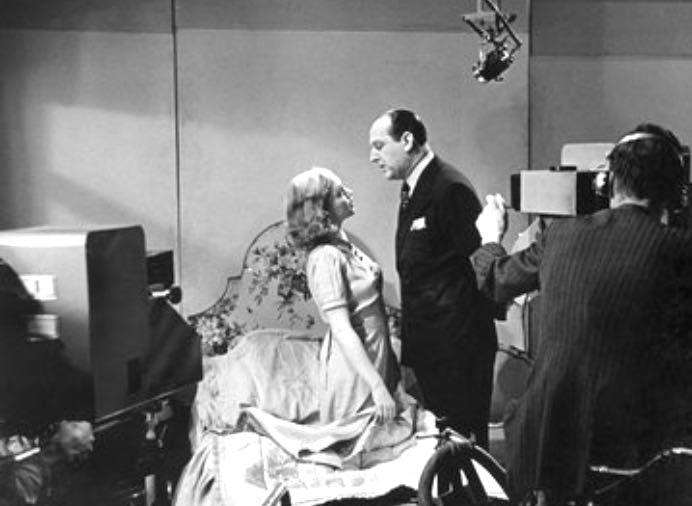
John Wyver writes: The evening of Sunday 5 March 1939, from 9.08pm to 10.54pm, was taken up with a studio restaging of Little Ladyship (above), written by Ian Hay after the Hungarian original by Istvan Bekeffi and Adorjan Stella. For one night only Gardner Davies’ successful staging had been translated by producer Lanham Titchener from the Strand Theatre to the AP studios.
A little over a week later, the show prompted a letter to the press from theatrical impresario Emile Littler, complaining that while conventional theatres were barred by law from opening on Sundays, there was no such restriction on television. Littler’s letter was one salvo in a campaign that would only reach a successful conclusion 33 years later.
read more »
4th March 2025
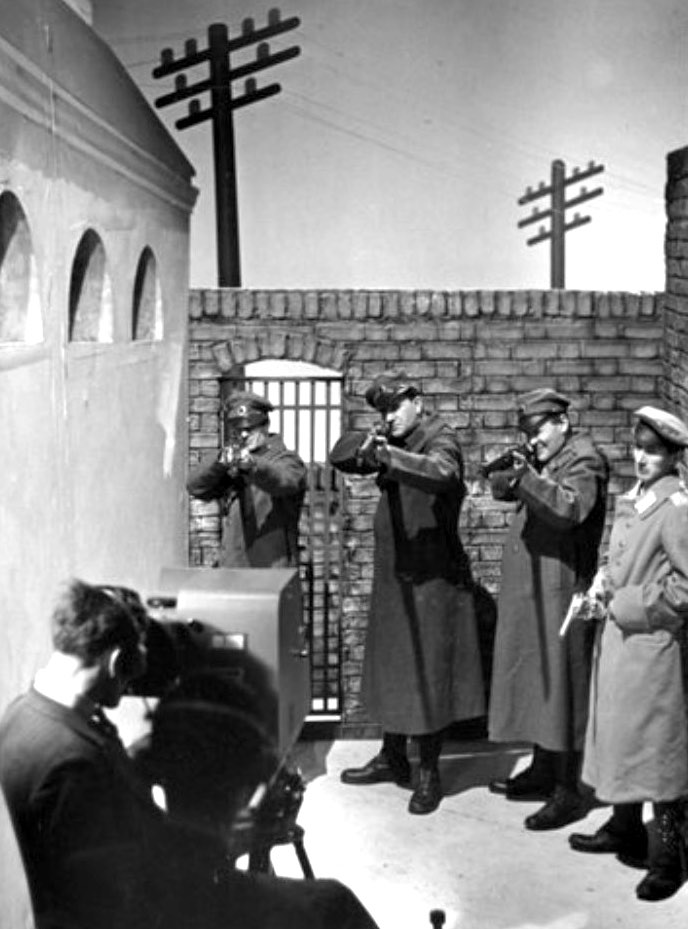
John Wyver writes: Having celebrated yesterday, with the post on Teresa Deevey’s The King of Spain’s Daughter, the breadth of the television drama produced at AP before the war, here is a recognition of how formally innovative it could also be.
First shown on Saturday 4 March 1939, Condemned to be Shot was billed as ‘a play in the first person’ by R.E.J. Brooke (presumably actor Reginald Brooke, playing ‘An officer’), with Jan Bussell as the producer.
At the start, an announcer informed viewers that the short play ‘is in the nature of a new experiment in dramatic production by television. Viewers will be invited by the chief character to put themselves in his place.’
read more »
3rd March 2025
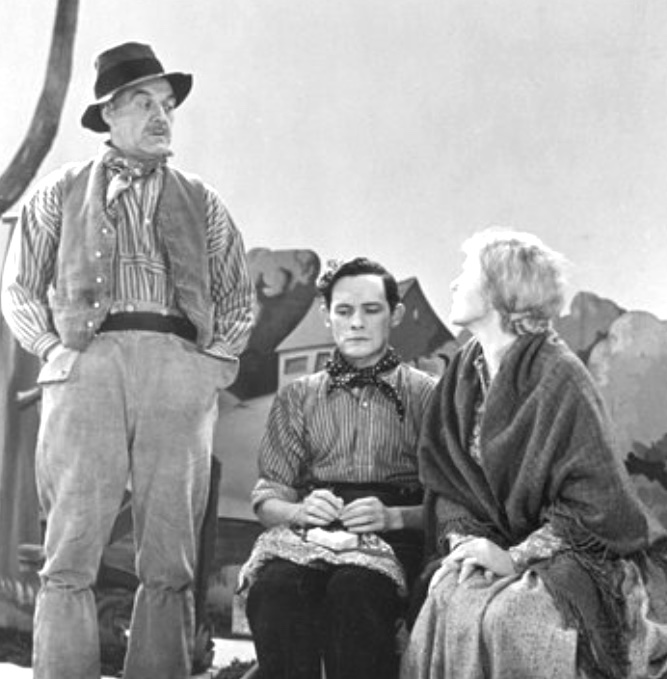
John Wyver writes: The eclecticism and breadth of the drama produced pre-war at Alexandra Palace is indicated by the production on Friday 3 March 1939 of The King of Spain’s Daughter by Teresa Deevy. This was a play that had premiered at the Abbey Theatre, Dublin on 29 April 1935, and was now presented by producer Denis Johnston with Phyllis Ryan as Annie Kinsella (above, right). Also in the cast were Brefni O’Rorke (above, left), Patrick Boxhill (centre), Ann Clery and Tony Quinn.
As Úna Kealy has written of the play,
This brief and potent drama can be read as a feminist intervention into Irish social and cultural life as, in Annie Kinsella, Deevy creates a woman who dares to imagine the world differently.
read more »
2nd March 2025
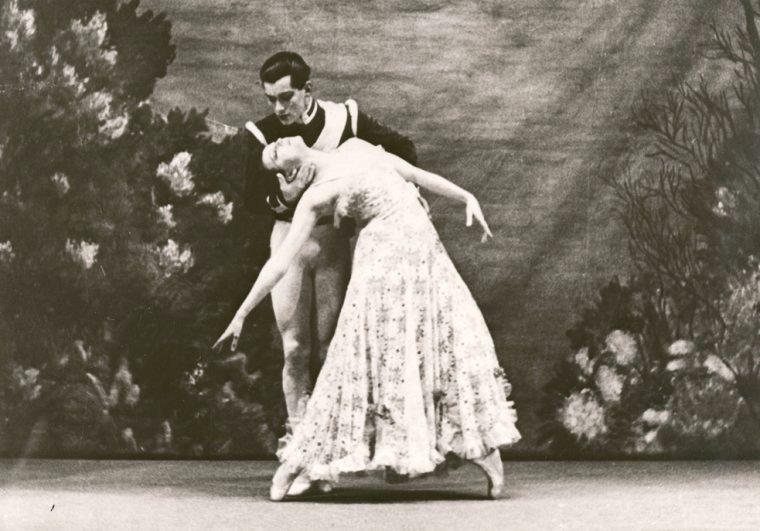
John Wyver writes: the afternoon of Tuesday 2 March 1937, just four months after the AP service had begun, featured one of television’s most innovative pre-war programmes. Fugue for Four Cameras was a strikingly experimental six-minute dance collaboration created by producer Stephen Thomas with choreographer Antony Tudor.
The broadcast began with Maude Lloyd centred on screen dressed in practice costume and performing a classical solo to J.S. Bach’s ‘Fugue in D Minor’ . As a second musical theme was introduced, a superimposed image of Lloyd from another camera joined her on screen, and then a third, and a fourth.
read more »
1st March 2025
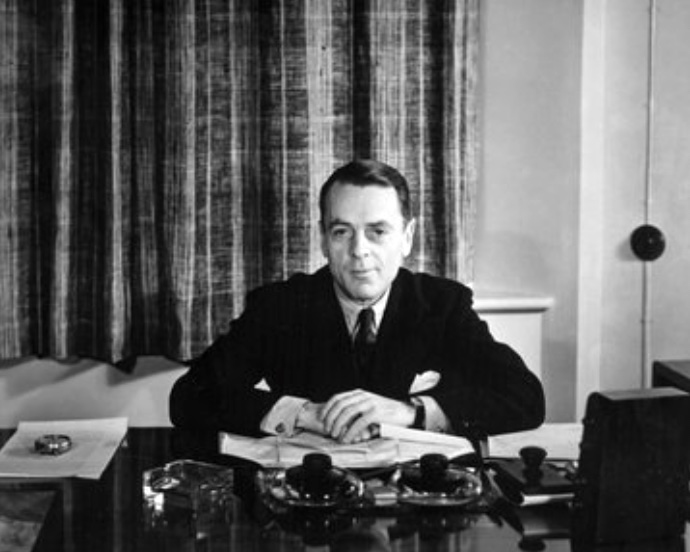
John Wyver writes: Sunday 1 March 1936 saw The Observer splash an exclusive interview with BBC director of television Gerald Cock (above, in his Alexandra Palace office) eight months ahead of the offical opening of the service. The article, bylined only ‘Our television correspondent’, is a fascinating glimpse of Cock’s sense of what television might be and could be, as well as being striking for the differences between aspirations and what eventually went to air.
read more »









